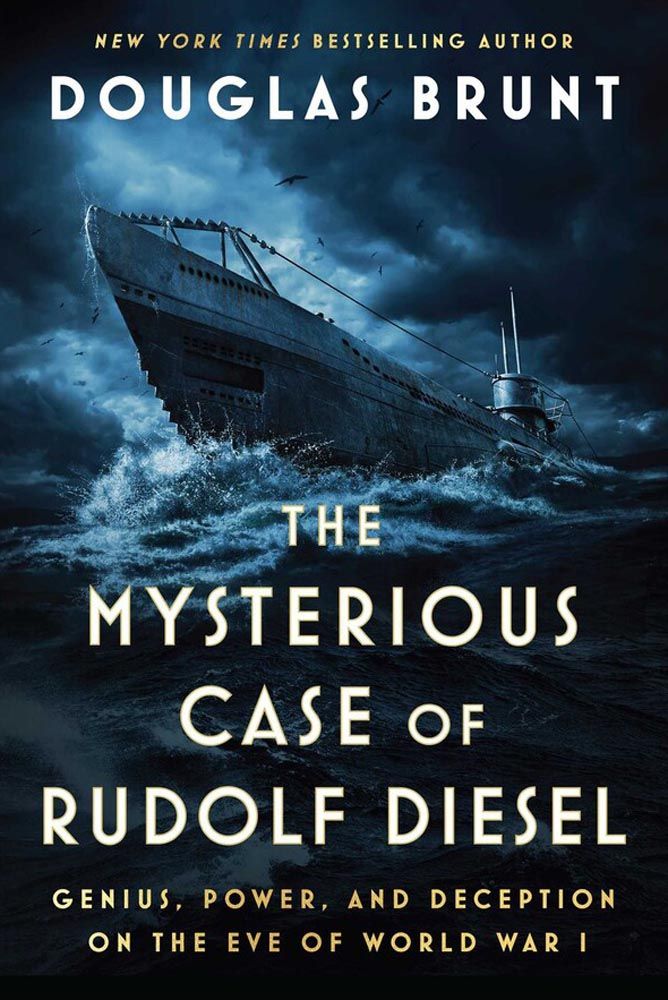The Mystery of Diesel Lost at Sea
A new historical book examines Rudolf Diesel
Gear Technology readers know diesel—because of the fuel’s properties, such as viscosity, lubricity, and combustion characteristics—can influence the design considerations for gears within the diesel engine. Diesel engines are known for their high torque output, especially at low engine speeds. Gears in diesel engines must be designed to handle the higher torque loads and transmit power efficiently without excessive wear or failure. The profiles, size, materials, and overall strength should be appropriately specified to withstand the specific torque and load characteristics of diesel engines.
What our readers might not know is on September 30, 1913, The New York Times led with a headline that Rudolf Diesel—multimillionaire inventor of the diesel engine and international superstar in the scientific community—had disappeared from the passenger steamship, Dresden, crossing from Belgium to England and was presumed dead. In addition to building the world’s most prominent ICE, Diesel is credited with inventing—no joke—the ice cube. While living in France and working for Carl von Linde, the pioneer of refrigeration, France awarded Diesel the patent for carafes frappes transparentes (bottled clear ice) on September 24, 1881.
At the time of his disappearance, his invention—the diesel engine—was in the process of transforming almost every aspect of industry and transportation around the world. First publicly presented in Kassel, Germany on June 16, 1897; the diesel engine was vastly more efficient than the steam engine. Diesel’s initial vision for the engine was to alleviate the appalling working conditions of the Industrial Revolution by offering a new power source that was far more efficient, produced far less pollution, and could burn a range of substances for fuel—including vegetable and nut oils that all countries could produce domestically so as not be beholden to petroleum monopolies.
Fast forward to preparing for this piece, a banner ad appeared above the New York Times homepage for a major fuel company that promoted those precise benefits of diesel. Diesel remarked to the American press in 1912 that he would like to see the diesel engine power the entire American railroad system while using only butter for fuel, “If you would kindly lend me the butter.”
The contributions of Diesel and his engine are among the most underappreciated of the last hundred years. For example, the MS Selandia, “the ship that changed the world,” of the Danish East Asiatic Company, begins her maiden voyage on February 22, 1912, considered the most advanced ocean-going diesel motor ship of her time. Not only did the diesel engine enable the submarine in both world wars (the submarine was previously an ineffective vessel without diesel), but it has also powered every train, truck, cargo ship, and piece of heavy equipment throughout the 20th century.
The diesel engine came to prominence at the height of European militarism and the Anglo-German naval arms race. Virtually every Allied naval vessel used in the D-Day invasion had a diesel engine. The engine delivered enormous military advantages, but expertise with the nascent technology was limited to very few engineers. Today, the diesel engine—largely unchanged from Diesel’s own original design—continues to power almost every form of transportation in the world.
So, what happened to the man behind the machine? New York Times bestselling author and historian Douglas Brunt reopens the hundred-year-old mystery of what became of Rudolf Diesel in his new book The Mysterious Case of Rudolf Diesel: Genius, Power, and Deception on the Eve of World War 1 (Atria Books, forthcoming September 19, 2023). Though there was an initial storm of media reporting about Rudolf Diesel’s disappearance in 1913, this book examines previously unexamined evidence and includes the consultation of police detectives and former members of the OSS (Office of Strategic Services, now known as the CIA) and UK Special Forces. Brunt skillfully weaves history with intrigue while presenting a new theory on Diesel lost at sea.
simonandschuster.com/books/The-Mysterious-Case-of-Rudolf-Diesel/Douglas-Brunt/9781982169909







